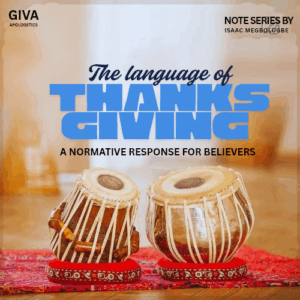The Language of Thanksgiving: A Normative Response for Believers
Isaac Megbolugbe
October 31, 2025
Introduction
In times of difficulty and sorrow, it may seem counterintuitive to celebrate or express gratitude. However, as believers, we are called to a different perspective – one that is rooted in the sovereignty of God and His promises. The Bible instructs us to “give thanks in all circumstances; for this is the will of God in Christ Jesus for you” (1 Thessalonians 5:18). This attitude of thanksgiving is not based on our circumstances, but on the character of God and His goodness towards us.
The Sovereignty of God and Gratitude
The foundation of gratitude lies in the sovereignty of God. We trust that He is in control, even when circumstances seem chaotic or unbearable. The Psalmist declares, “The Lord gave, and the Lord has taken away; blessed be the name of the Lord” (Psalms 1:21). This perspective allows us to bow to God’s sovereignty, even in the midst of difficulty.
Hope and Faith in Jesus Christ
Hope is not just a wish or a positive attitude; it is a mindset built on the foundation of faith in Jesus Christ. As believers, we know that God is faithful and true to His promises. We can trust in His goodness, even when we don’t understand our circumstances. The Bible says, “For we live by faith, not by sight” (2 Corinthians 5:7). Our hope is anchored in the promises of God, and we can give thanks in every situation, knowing that He is working all things together for our good (Romans 8:28).
The Power of Gratitude
Gratitude is a powerful attitude that can transform our lives. When we focus on what we are thankful for, we begin to see the world in a different light. Gratitude helps us to:
– Shift our focus: From our problems to God’s provision and goodness.
– Cultivate contentment: Recognizing that our sufficiency comes from God, not from our circumstances.
– Experience joy: Even in the midst of difficulty, we can experience joy and peace through gratitude.
*Practical Ways to Cultivate Gratitude*
So, how can we cultivate gratitude in our lives? Here are a few practical suggestions:
– *Keep a gratitude journal*: Write down things you are thankful for each day.
– *Pray with thanksgiving*: Express your gratitude to God in prayer, even in the midst of difficulty.
– *Share your gratitude*: Express your thanks to others, whether it’s a kind word or a written note.
*Conclusion*
In conclusion, the language of thanksgiving and gratitude is always normative for believers. It’s a response to the sovereignty of God and our trust in His promises and power. As we cultivate gratitude, we can experience a deeper sense of joy, contentment, and hope, even in the midst of difficulty. May we give thanks in every circumstance, knowing that God is working all things together for our good. We don’t need to apologize for using language of celebration in an atmosphere of funeral .
Isaac Megbolugbe, Director of GIVA Ministries International, retired professor at Johns Hopkins University, 2024 Marquis Organization’s Class of Top Executives in the United States of America and a Fellow of the Royal Institution of Chartered Surveyors. He is resident in the United States of America.
